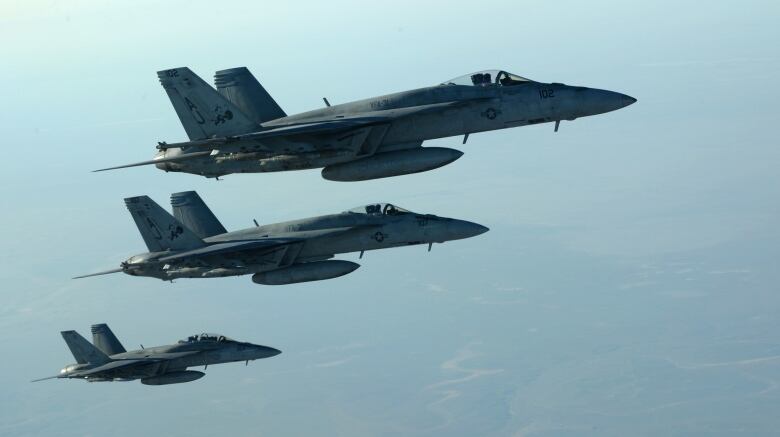ISIS-controlled oil refineries hit by airstrikes in Syria, witness says
Airstrikes increasing price of fuel for civilians

Air raids believed to have been carried out by U.S.-led forces hit three makeshift oil refineries in northern Syria on Sunday as part of a campaign against Islamic State, a human rights group said.
- British PM plans new laws to tackle terrorism threat
- Canada’s young men joining foreign jihad: Are we doing enough to stop it?
The United States has been carrying out strikes in Iraq since Aug. 8 and in Syria, with the help of Arab allies, since Tuesday, with the aim of "degrading and destroying" the militants who have captured large areas of both countries.
U.S. President Barack Obama has been seeking to build a wide coalition to weaken Islamic State, which has killed thousands and beheaded at least three Westerners.
In a potential boost for the United States, a jihadist Twitter account said the leader of an al-Qaeda-linked group had been killed in a U.S. air strike in Syria, the SITE service said.
A U.S. official said on Sept. 24 that the United States believed Mohsin al-Fadhli, leader of the Khorasan group, had been killed in a strike a day earlier, but the Pentagon said later it was still investigating.
But in a tweet on Sept. 27, a jihadist offered condolences for the death of Fadhli, SITE, a U.S.-based organization that monitors militant groups online, said on Sunday.
Nusra Front leader issues warning
In Washington, Tony Blinken, deputy White House national security adviser, said on Sunday that officials could not yet confirm the death.
U.S. officials have described Khorasan as a network of al-Qaeda fighters with battlefield experience mostly in Pakistan and Afghanistan that is now working with al-Qaeda's Syrian affiliate, the Nusra Front.

The head of the Nusra Front said the air strikes would not eliminate Islamists in Syria and warned that the group's supporters could attack inside Western countries.
In a 25-minute audio message posted on jihadi forums, Abu Mohamad al-Golani urged European and U.S. citizens to denounce the strikes, which he said could trigger retaliation from Muslims.
- WATCH | How to stop cash flow to ISIS
- Harper says Canada won't 'stand on the sidelines' of ISIS fight
- How ISIS uses captured oil fields to finance its campaign
"We will use all that we have to defend the people of Syria...from the Crusader alliance," al-Golani said. "And we will use all possible means to achieve this end," he said, without offering more details.
He went on to warn Western countries against taking part in the alliance in words that echoed those of the late founder of al-Qaida, Osama bin Laden.
"This is what will cause the battle to be transported to the hearts of your own homes; because Muslims will not stand idly by and watch Muslims be bombed and killed in their countries, while you are safe on your countries. The price of war will not be paid by your leaders alone. You will pay the biggest price," he said.
Price of fuel rising for civilians
The Britain-based Syrian Observatory for Human Rights said the latest air strikes in northern Syria occurred shortly after midnight in Raqqa province.
Rami Abdelrahman of the Observatory said that destroying the makeshift refineries has led to a sharp increase in the price of diesel, adding that in Syria's northern Aleppo province the price has more than doubled.
"The price went up from 9,000 Syrian pounds to 21,000 in Aleppo. Hitting these refineries has affected ordinary people, now they have to pay higher prices," he told Reuters.

A medium-sized makeshift refinery, mounted on trucks, can refine up to 200 barrels of crude a day into fuel and other products.
But the impact of the strikes on ISIS was not immediately clear. ISIS has gained support among Islamists following the attacks, including from rival groups. Scores of fighters have left al-Qaeda's Nusra Front and other Islamist groups in Syria to join IS since the strikes started.
The air strikes have failed so far to stop the advance of Islamic State fighters on the Syrian Kurdish town of Kobani near the border with Turkey which the group has attacked from three sides, triggering an exodus of more than 150,000 refugees.
With files from The Associated Press